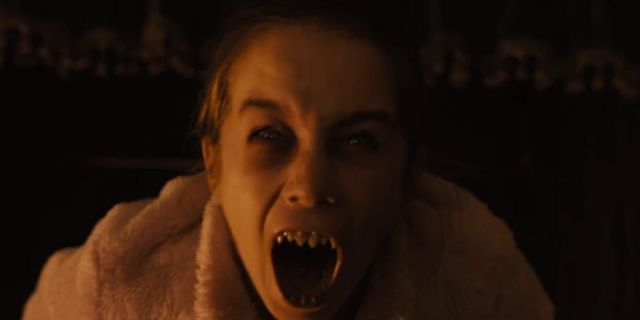Since the Marvel Cinematic Universe experiment demonstrated its success and claimed dominion over blockbuster entertainment in the early 2010s, every studio has tripped over itself to claim a piece of its pie. Most examples have been pitiful, cloying, and intolerably ill-conceived. Almost every other cinematic universe refused to put in the work Marvel dedicated to its first few entries and fell apart early. Universal tried the Dark Universe in 2017, but its first entry tanked so savagely that all future plans were abandoned. With this year’s Abigail, they may be trying again.
Hollywood has always been an industry of followers marching in lock-step behind profitable trends. Now that superhero movies are starting to show diminishing returns, viewers will watch the companies scramble to find the next big thing. The streaming boom rendered the game unpredictable in a fun new way. Despite the market’s chaotic nature, most studios would try something outdated rather than take a risk on something new. That might push them to make some dodgy decisions. It could even convince them to make the same terrible call twice.
What is Abigail based on?

Matt Bettinelli-Olpin and Tyler Gillett’s Abigail is the latest link in a long chain of loose adaptations. It’s a modern reimagining of Dracula’s Daughter, the 1936 sequel to Universal Pictures’ Dracula. Dracula’s Daughter is ostensibly based on “Dracula’s Ghost,” a 1914 short story by Bram Stoker that may have been written as the first chapter of his magnum opus before being ditched by the publisher. Dracula’s Daughter has nothing to do with “Dracula’s Guest” narratively, but it does bear some resemblance to Carmilla, Joseph Sheridan Le Fanu’s prototypical lesbian vampire story. Many claim that “Dracula’s Guest” was an homage to Carmilla, making the chain of command slightly complicated. Abigail seems to have little to do with Dracula’s Daughter other than the central premise concerning Dracula’s young female spawn. It is, however, an adaptation of another classic Universal Monster movie.
What was the Dark Universe?

Throughout the 30s, Universal Monster Movies grew organically from a handful of horror films adapted from classic stories to a bizarre shared universe. Decades later, Marvel delivered the first successful intentional version of the gimmick and sparked a race to join them. Universal, naturally, saw potential in their long-dead horror characters, prompting them to rework their monsters into superhero shapes. As their fourth entry in the Brendan Fraser-led Mummy franchise hit a snag, Universal rebooted the series as the first entry in their new Dark Universe. They briefly attempted to rope in their 2014 film, Dracula Untold, but its weak financial performance dissuaded them from that notion. On the day of The Mummy‘s premiere, Universal posted a cast photo of stars set to appear in future Dark Universe projects. The Mummy was universally panned and financially disastrous, leading Universal to pull the plug immediately. They initially planned follow-ups like:
- A remake of Bride of Frankenstein with Angelina Jolie in the title role set to release in 2019.
- A reimagining of The Invisible Man with Johnny Depp
- A new take on Van Helsing, possibly starring Channing Tatum
- A solo film for Russel Crowe’s Dr. Jekyll and Mr. Hyde
- The Wolfman with Dwayne “The Rock” Johnson, which may still emerge with Ryan Gosling in the title role
- Something related to The Creature from the Black Lagoon with Scarlett Johansson
For good or for ill, most of these projects will never see the light of day because they had the poor fortune of being attached to The Mummy. The Dark Universe branding has only ever appeared before one film, but Universal didn’t stop remaking their old creature features.
Is Abigail part of the Dark Universe?

Presently, Universal maintains that its new crop of monster movies is unrelated to the others and the discarded Dark Universe brand. Leigh Whannell’s The Invisible Man, Chris McKay’s Renfield, and the upcoming Abigail are standalone adaptations of classic stories, each of which boasts unique creative teams and tones. There have been no teases or Easter eggs toward a shared universe. Justin Kroll’s 2023 piece in Deadline announcing the then-untitled Abigail features this quote:
Universal Monster films are rooted in the horror genre, with no restrictions on budget, rating or genre. They are not part of a shared interconnected universe, which allows each film to stand on its own. This new direction is filmmaker-driven, inviting innovative filmmakers with original, bold ideas for these characters to develop the stories and pitch them.
R. M. Renfield, Cecilia Kass, and Dracula’s daughter Abigail have not enjoyed any cross-over so far. Each film is a standalone introduction to a new potential monster. However, as they build their roster, they very well could restart the Dark Universe with these characters as their heavy hitters. Throw in that potential Wolfman remake and they have a starting Avengers line-up. Universal would be wise to continue its current trajectory and make cheap, reasonably successful horror films with its myriad licenses. Though that would be the best idea, there’s still plenty of room to make the same mistake twice.











Leave a Reply